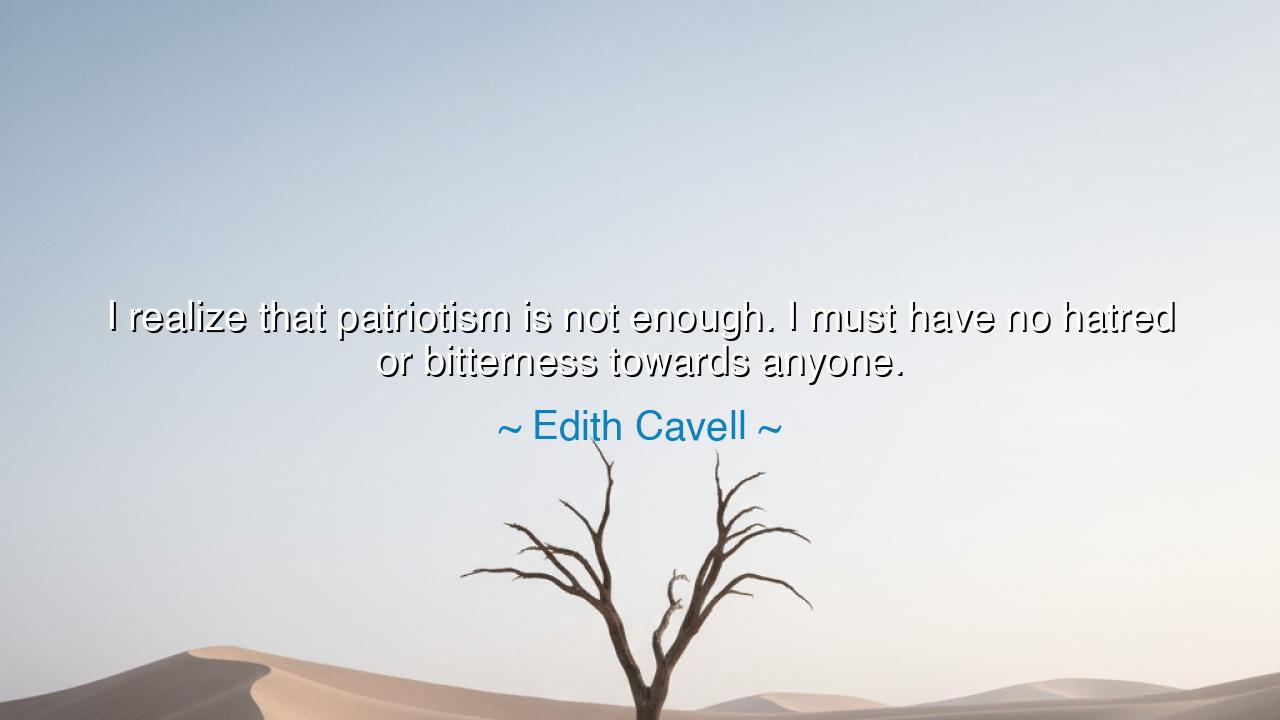
I realize that patriotism is not enough. I must have no hatred
I realize that patriotism is not enough. I must have no hatred or bitterness towards anyone.






“I realize that patriotism is not enough. I must have no hatred or bitterness towards anyone.” These were the final words of h Cavell, the English nurse who met death before a German firing squad in 1915. In this moment, she spoke not with bitterness, nor with anger, but with a wisdom that shines like a beacon across the ages. Her words remind us that patriotism, though noble, is incomplete when it is chained to hatred. For true love of one’s country is not proven by the measure of one’s enemies despised, but by the measure of one’s heart enlarged to embrace even those who bring harm.
Cavell had devoted her life to service, tending the wounded without distinction of side—German, Belgian, or Allied. To her, humanity was higher than enmity, and compassion greater than politics. Yet she was condemned for aiding soldiers to escape, and in her final hours, she bore no malice against her captors. Instead, she declared that patriotism is not enough. By this she meant that love of country, while sacred, must be joined with love of humanity; otherwise, it hardens into cruelty and becomes unworthy of the name.
The origin of her saying lies not in theory but in her very life and death. In the First World War, nations stirred their peoples with fierce cries of loyalty, but such cries were often mingled with venom toward the foe. Cavell saw beyond this. She knew that if love of country breeds hatred, then it destroys the very soul it seeks to defend. Thus, her final testimony was both a confession and a teaching: serve your country, but let your service be without bitterness; honor your land, but do not let that honor be sullied by hatred.
History confirms the power of her insight. After the American Civil War, President Abraham Lincoln, in his second inaugural address, declared, “With malice toward none, with charity for all.” He, too, understood what Cavell proclaimed: that war may end, but hatred endures if not banished from the heart. Only forgiveness and compassion can rebuild a nation after its trials. Cavell’s words stand in this same lineage of wisdom: the recognition that the greater victory is not on the battlefield, but in the human heart freed from enmity.
The lesson, then, is eternal: patriotism must be joined to compassion, or it becomes dangerous. Love your country, yes, but also love justice, mercy, and humanity. Without these, patriotism descends into nationalism, and nationalism into hatred. Cavell’s words caution us: to live with bitterness is to die in bondage, but to release hatred is to live free, even in the face of death itself.
And what then shall we do? In our daily lives, we must examine our loyalties. Do we love our country in a way that uplifts, or in a way that despises others? Do we serve only our own, or do we extend compassion across lines of race, creed, and nation? The true patriot, as Cavell taught, serves without hatred, remembering that humanity is greater than all boundaries.
Practically, this means living with kindness even toward those who oppose us. It means seeking peace where others cry for vengeance, and offering forgiveness where others demand retribution. It means remembering that in every foreign soldier, every supposed enemy, there beats a human heart as fragile and precious as our own. By living in this way, we honor our country not with bitterness, but with the strength of compassion.
Thus let h Cavell’s words echo as eternal teaching: patriotism is not enough. The heart must be free from hatred if love of country is to be pure. And when the day comes that you, too, are tested by conflict, remember her example: stand firm in loyalty, but let your spirit remain unstained by bitterness. For in that balance lies the highest form of service, the noblest form of love, and the truest form of patriotism.






AAdministratorAdministrator
Welcome, honored guests. Please leave a comment, we will respond soon